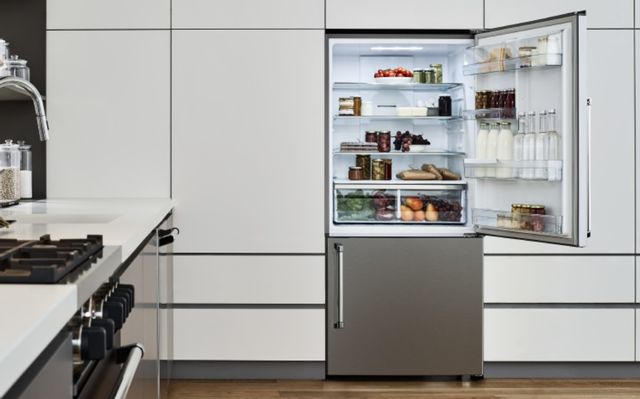
At a Glance
How Much Power Does a Refrigerator Use?
Which Appliances Use the Most Electricity?
3 Energy-Efficient Refrigerator Models
Electricity is measured in watts, a unit that quantifies the rate of energy consumption over time.
For example, a typical refrigerator uses between 100 and 250 watts. But what does that really mean in daily usage? Is it 100 watts per day, per hour, or per minute? And how does this compare to the energy usage of other common household appliances?
If you're looking to lower your energy consumption, understanding how many watts your refrigerator uses is a good starting point. In this guide, we’ll break down how much energy different appliances consume and explore energy-efficient refrigerators, along with other ways to save on your utility bills.
Shop Energy-Star Qualified Refrigerators
In-Stock RefrigeratorsHow Much Power Does a Refrigerator Use?
Homeowners often ask, “How many watts does a refrigerator use?” because they want to know how much it costs to run their fridge. If the concept of wattage feels confusing, a better way to think about it is in terms of energy usage and its impact on your electric bill.
To get started, check the manual or the compliance label inside your refrigerator. This label will show how many watts your fridge uses. Once you know the wattage, you can estimate how often it runs. Even though a refrigerator works constantly to keep your food cold, the motor only kicks in when it needs to cool the inside. Older or less efficient refrigerators need to run more often, which can increase your energy costs.
For example, if your refrigerator runs for 15 minutes every hour, it’s on six hours daily (15 minutes x 24 hours = 360 minutes, or 6 hours).
If your refrigerator uses 125 watts, its total energy usage for the day would be 750 watts (125 watts x 6 hours), which is 0.750 kilowatts per day.
To figure out the cost, check your energy bill for the price per kilowatt-hour (kWh). For instance, if your energy rate is $0.25 per kilowatt, then your refrigerator would use 274 kilowatts (365 days x 0.750 kWh) over the course of a year, costing you about $68 annually.
You can use this same method to estimate the energy costs of other appliances in your home. Just check their wattage and how often you use them to see which items cost the most to operate.
.png)
Which Appliances Use the Most Electricity?
Understanding how much electricity a refrigerator uses becomes easier when you compare it to other appliances in your home.
While it may feel like your refrigerator is a big energy user because it runs all day, keep in mind that appliances like microwaves or ovens are used for short periods, so they consume less energy overall. To get a clearer picture of your energy usage, look at how different appliances stack up. Here are some of the biggest energy consumers in the average home:
- Air conditioner: $460 per year (on average)
- Dryer: $105 per year
- Refrigerator: $80 per year
- Television: $40 per year
- Washer: $10 per year
In some homes, air conditioning can make up as much as 40% of the total electric bill, especially during the hottest months of the year. While upgrading to an energy-efficient refrigerator can help save a little money, one of the most effective ways to reduce your energy bill is by adjusting your thermostat.
Increasing the temperature in your home by just a few degrees can make a big difference. This will allow your HVAC system to work less and lower your overall cooling costs.
5 Energy-Efficient Refrigerator Models
You don’t have to look very far to find energy-efficient refrigerators. Here are three examples of appliances in different sizes, brands, and designs.
Bosch 500 Series 36 in. 26.0 Cu. Ft. Stainless Steel French Door Refrigerator
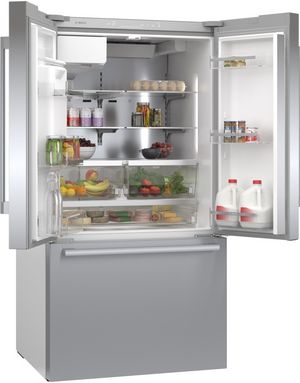
Shop Bosch 26.0 Cu. Ft. French Door Refrigerator
The Bosch French Door Refrigerator is designed with energy efficiency and modern convenience in mind. It keeps your food fresh while minimizing electricity use.
This model features Bosch’s MultiAirFlow™ system, which circulates cool air evenly throughout the refrigerator to maintain consistent temperatures, reducing the need for the compressor to work overtime.
With LED lighting that offers bright, efficient illumination and the ENERGY STAR certification, this refrigerator is built to save energy and lower your utility costs.
You can trust Bosch’s reputation for quality and reliability, ensuring that your appliance not only performs well but also helps you manage your energy consumption effectively.
LG 25.5 Cu. Ft. PrintProof Stainless Steel Bottom Freezer Refrigerator
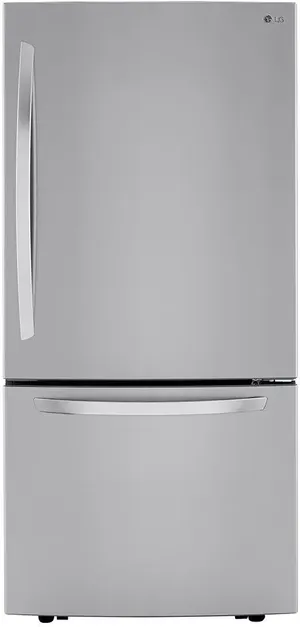
Shop LG 25.5 Cu. Ft. Bottom Freezer Refrigerator
Large refrigerators aren’t necessarily less energy-efficient than others. If you have a big family, you need a substantial refrigerator to feed everyone who lives with you.
Plus, investing in a large fridge can reduce your energy costs over keeping a second one in your garage or basement. Buying from a trusted brand is also a good way to find energy-efficient appliances. This model by LG is an ENERGY STAR® refrigerator, which means it was designed with lower energy consumption goals in mind.
This LG refrigerator has plenty of other features that will make you love it. The Multi-Air Flow Freshness System is designed to keep your food fresh longer. Environmentally conscious shoppers will appreciate how their produce and dairy products last longer, reducing their food waste levels. The Smart Cooling® system maintains a consistent temperature, even if your kids continuously open the refrigerator door throughout the day.
⭐Featured LG Refrigerator #LRDCS2603S Review:
"We like the adjustable shelves, ample storage space on the door, and easy roll-out food storage drawers. We like the bottom freezer for easy access and the large amount of storage space for frozen foods."
Frigidaire 10.1 Cu. Ft. Black Top Freezer Refrigerator
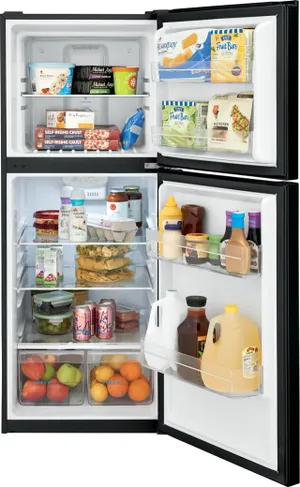
Shop Frigidaire 10.1 Cu. Ft. Black Top Freezer Refrigerator
There’s a common misconception that energy-efficient refrigerators have to be expensive. This might have been true in the past, but most of today’s models are built with electricity consumption in mind. For example, you can buy this Frigidaire refrigerator for less than $1000. It is an ENERGY STAR® certified appliance that was also designed to maximize storage.
The Store-More™ humidity-controlled crisper drawers are designed to create an ideal environment for fruits and vegetables. The electronic temperature controls easily let you choose energy-saving settings. Every element of this refrigerator is designed to make food storage easier in your home.
⭐Featured Frigidaire Refrigerator #FFET1022UV Review:
"Replaced an older model. Same outside size, but more capacity and better organization and storage. Far better temperatures in both the freezer and refrigerator for food storage."
Samsung Bespoke 36 in. 29.0 Cu. Ft. Stainless Steel French Door Refrigerator
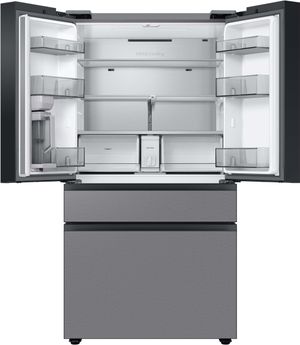
Shop Samsung 29.0 Cu. Ft. French Door Refrigerator
Blending modern style, innovative technology, and energy efficiency, the Samsung French Door Refrigerator with AutoFill Water Pitcher is ENERGY STAR® certified to help you save on electricity while still delivering top-tier performance.
In addition to its energy-saving benefits, the Samsung Bespoke comes packed with features that enhance convenience. The AutoFill Water Pitcher provides easy access to fresh, filtered water without needing to refill manually.
Its Smart Cooling® system ensures a consistent temperature throughout, keeping your groceries fresh longer. With a modern, customizable design, this refrigerator not only fits seamlessly into your kitchen but also aligns with eco-conscious living.
⭐Featured Samsung Refrigerator #RF29BB8200QL Review:
"I bought this refrigerator a few weeks ago and I absolutely love it! I love the design so much space inside. It's a bespoke model so I asked her switched out the panels. Love it!"
GE 36 in. 27.0 Cu. Ft. Fingerprint Resistant Stainless Steel French Door Refrigerator
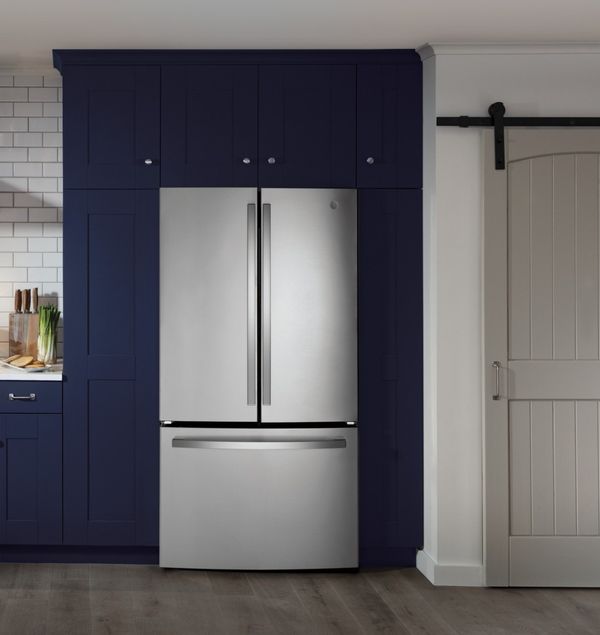
Shop GE 27.0 Cu. Ft. French Door Refrigerator
With a focus on energy efficiency and modern design, the GE French Door Refrigerator helps keep your food fresh while minimizing electricity use, making it an environmentally friendly solution for your home.
This model features advanced cooling technology that ensures an even distribution of cold air throughout the fridge, keeping all your groceries at the perfect temperature while minimizing the need for constant compressor use.
With its fingerprint-resistant stainless steel finish and bright, energy-saving LED lighting, this refrigerator not only looks great but also meets ENERGY STAR® standards for efficiency, helping you lower your utility costs.
⭐Featured GE Refrigerator #GNE27JYMFS Review:
"The fridge looks great and has a lot of space on the inside. The upper and lower interiors are both designed and laid out very well. Lots of storage! We were a little apprehensive about hooking up the ice maker (never had one before), but we decided to have a go at it and see how it is."
Energy-Saving Tips for Refrigerator Usage
Lower your refrigerator’s energy consumption with these simple tips:
-
Optimal Placement: Keep your fridge away from heat sources like ovens or direct sunlight, and ensure proper airflow around it to prevent the compressor from overworking.
-
Maintenance: Clean coils twice a year and check door seals to prevent air leaks. Defrost your fridge if ice buildup becomes excessive to maintain efficiency.
-
Organize Efficiently: Avoid overpacking the fridge to allow proper air circulation. Keep it well-stocked to maintain consistent cooling, using water jugs if needed.
-
Smart Settings: Set the fridge to 37°F and freezer to 0°F for ideal efficiency. Use energy-saving modes when appropriate to reduce power use.
By following these tips, you’ll reduce refrigerator energy use, cut costs, and extend the life of your appliance.
How to Extend the Lifespan of Your Refrigerator and Maintain Energy Efficiency
Proper maintenance is key to extending the lifespan of your refrigerator and keeping it energy-efficient. Here are some essential tips to ensure your appliance performs well for years:
1. Clean the Coils
- Dust and debris can collect on your refrigerator’s condenser coils, making it work harder and use more energy. Clean the coils every 6 months to maintain optimal efficiency.
2. Check and Seal Leaks
- Inspect the door seals (gaskets) regularly to ensure they are intact. Worn-out seals can cause cold air to escape, forcing the refrigerator to use more energy. Replace damaged seals to prevent air leaks.
3. Defrost When Necessary
- If your fridge isn’t frost-free, ice buildup can reduce its cooling efficiency. Defrost your refrigerator when ice is more than ¼ inch thick to keep it running smoothly.
4. Set the Right Temperature
- Keep your fridge at 37°F (3°C) and your freezer at 0°F (-18°C) for optimal performance. Avoid lowering the temperature too much, as it won’t improve food preservation and will waste energy.
5. Create a Maintenance Schedule
- Stick to a routine maintenance checklist to ensure your refrigerator stays in top condition. A sample schedule could include:
- Monthly: Check door seals and remove unnecessary ice buildup.
- Every 6 months: Clean condenser coils and inspect the temperature settings.
- Annually: Check for any unusual noises or changes in performance.
FAQ
Here are some frequently asked questions about refrigerator energy consumption:
How many amps does a refrigerator use?
Most refrigerators use between three to five amps, depending on their voltage needs. The more powerful the refrigerator, the more amps it uses. This also means the refrigerator will have a higher wattage and cost homeowners more. When shopping for a new refrigerator, ask about the wattage and look for ENERGY STAR® certification before making a purchase.
Why is energy efficiency important?
More customers are interested in energy-efficient appliances because they want to reduce their environmental impact. However, reducing energy use has other benefits. Efficient models cost homeowners less in the long run. By using less energy, homeowners pay less on their electric bills. Even a reduction of a few dollars a month can help a family save money.
Why do refrigerators get less efficient over time?
The more you use your refrigerator, the less energy efficient it will be. If your refrigerator is over 10 years old, the sealant between the door and the main compartment might break down. Cold air will begin to leak out, causing your refrigerator to run more. Motors also break down over time, so your appliance must run longer to provide the same results.
Why Trust East Coast Appliance?
Locally owned and operated since 1988, East Coast Appliance is the largest independent appliance dealer in Virginia. We sell it ALL — from new name-brand appliances to scratch-and-dent appliances to our very own refurbished appliances. Aside from our huge selection of every major brand and everyday low prices, what sets us apart from our competitors is that we service what we sell and that we are locally owned and operated with factory-trained associates. And if you’re a local, great news: East Coast Appliance is committed to providing the absolute lowest prices on the same available brand and model — simply bring in the ad of the local retail competitor while the lower price is in effect and you'll receive your price match.
Shop Refrigerators at East Coast
There is a reason we are dubbed “The Discount King” — for unbeatable deals, shop refrigerators online at East Coast Appliance. Our friendly associates are always happy to help you find the best energy-efficient refrigerator for your kitchen, whether you call us or use our online chat feature. Better yet, stop by one of our showrooms to see why we are the best appliance store in Virginia. Visit us today!
→ Learn More: 5 Best Mini Fridges You Want Immediately


